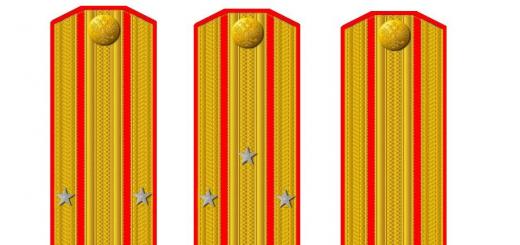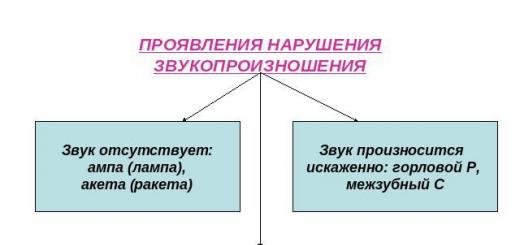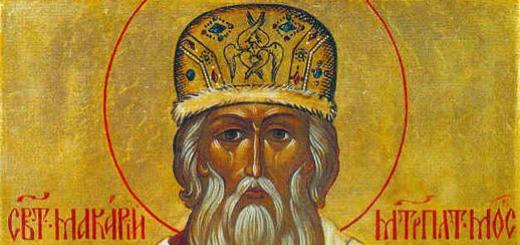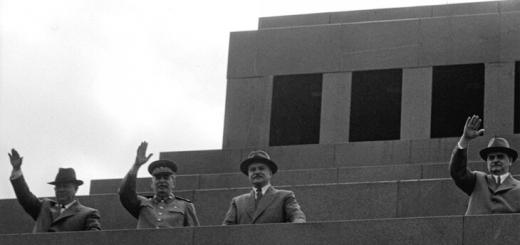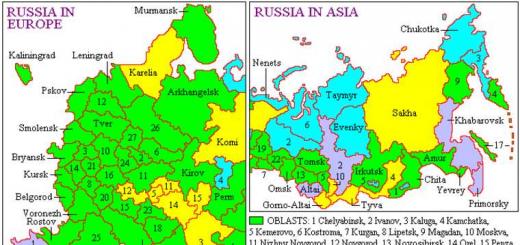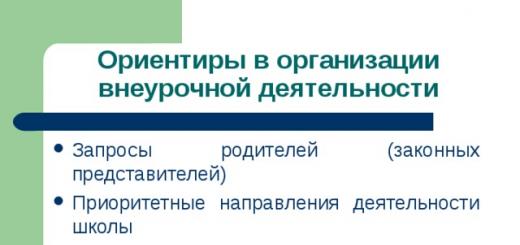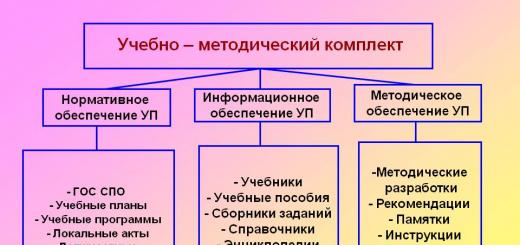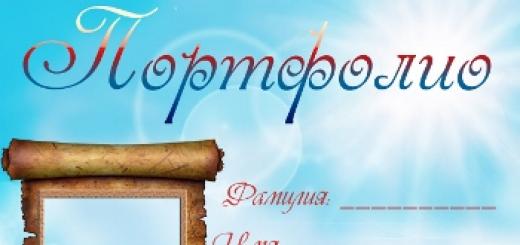We will find out whether he changed as the plot developed or was just revealed to us. We will also look at the images of the sons of the old Cossack, and study the character of Andriy from Taras Bulba and Ostap. Needless to say, people dreamed of throwing off the yoke. That is why Taras Bulba had a character born of time. At that time, Ostap is captured by the Polish, and Taras, with pain in his heart, sees the execution of his eldest son. Wanting to take revenge on the enemy, Bulba leads his army and strikes fear throughout Poland. The character of Andriy from Taras Bulba cannot be described in a few words. The eldest son, whom Taras Bulba raised, was completely different. Gogol described the image of Taras Bulba with great love and zeal for each character.
If Taras can be called a folk hero, and Ostap can be called a real Cossack, then what about Andriy? Who is he: a traitor, a daredevil, a foolish young man? This issue can be understood thanks to the detailed description of Andriy from Taras Bulba. In honor of the return of Ostap and Andriy, Bulba gathered all the centurions to show off their children. Taras Bulba's son Andriy is revealed throughout the entire work. The father could not understand this. Taras Bulba kills Andriy. The image of Andriy from Taras Bulba cannot be called unambiguous.

While studying at the bursa, Bulba's youngest son showed himself to be a lively, developed, intelligent and inventive person. His father was sure that in the future Andriy would become a glorious Cossack. Andriy loves nature and misses his mother a lot. The feelings of the young Cossack, which have not faded over several years, confirm how strong his love for the lady was.
Comparative characteristics of Ostap and Andria
Andriy differs from his brother in his greater emotional mobility: “... He was also seething with a thirst for achievement, but along with it his soul was accessible to other feelings. This spiritual need alienates him from his fellow Cossacks, becoming fatal. Having met a charming lady, Andriy falls in love with all the ardor of his youthful heart and renounces everything sacred for the Zaporozhye Cossack: faith, Fatherland, home. Of course, this is a betrayal. But betrayal almost always goes hand in hand with cowardice: this is not about Andriy.
A review of the story will allow you to understand how it turned out that, having grown up in the same family and raised in the same way, Taras’s children - Ostap and Andriy - are brothers and enemies. Taras Bulba loved his native Ukraine with all his soul. Taras Bulba proudly told all his friends that Ostap and Andriy would become real Cossacks. Ostap and Andriy fight with dignity. Andriy abandons his army and goes over to the enemy’s side. In the second battle, Bulba saw his son Andriy leaving the city gates with the Polish knights. The father cannot stand Andriy's betrayal. The author describes the appearance of Ostap and Andriy in general terms. Comparative characteristics of Ostap and Andriy will help to better and deeper understand both brothers. Two brothers - Ostap and Andriy - two destinies, two characters, two deaths.
This is the main characteristic of Andriy (the story “Taras Bulba”) and the reasons for his tragic death. After all, love and murder are two incompatible things, like “genius and villainy.” And Andriy (“Taras Bulba”) killed his comrades without any regret.
Nikolai Vasilyevich Gogol
In the story “Taras Bulba”, created by Nikolai Vasilyevich Gogol, we meet the three main characters: Taras Bulba, Ostap and Andriy. Let's try to answer these questions by tracing the short life path of this character, and also find the relationship between his actions and character with the realities of time. The characterization of Andriy from the story “Taras Bulba” is brought to your attention.
The image of the youngest son of the Cossack leader Taras Bulba is complex and contradictory. Andriy Bulba is a lord, a nobleman, an educated young man. By nature, the youngest son of Taras Bulba was a sensitive, desperate, ardent young man. Taras Bulba sees his youngest son quickly becoming carried away and impressionable.
Despite their differences, Ostap and Andriy had integral characters, only in Ostap this was manifested in devotion to work and the homeland, and in Andriy in his love for the beautiful lady. Both brothers are dear, but Ostap - to Andriy, his father, the Cossacks, and Andriy - even to the enemy: he took pity on the Polish girl. Ostap Bulba died for his homeland. Both Andriy and Ostap had a heroic beginning, but Ostap remained a hero, and Andriy could not control his feelings, and they defeated reason - Andriy betrayed his Motherland. Most of all I was interested in Ostap and Andriy. His younger brother, Andriy, had feelings that were somewhat livelier and somehow more developed.” When Ostap and Andriy studied at the bursa, Andriy came up with various ideas, and Ostap paid for them.
Hyperbole as the main device of Gogol's story "Taras Bulba" Nikolai Vasilyevich Gogol's story "Taras Bulba" is dedicated to the heroic struggle of the Ukrainian people against foreigners. Landscape and its role in Gogol’s story “Taras Bulba” The story “Taras Bulba” is one of the most beautiful poetic creations of Russian fiction. At the center of Nikolai Vasilyevich Gogol’s story “Taras Bulba” is the heroic image of a people who are fighting for justice and their independence from invaders. Khlestakovism" as a moral phenomenon Khlestakov is the central figure of Gogol's comedy "The Inspector General". Chichikov's visit to the landowner Korobochka In Gogol's poem “Dead Souls” the lifestyle and morals of the feudal landowners are very correctly noted and described.
Events of the story by N.V. Gogol's "Taras Bulba" takes place in the 16th century against the background of the confrontation between the Zaporozhye Cossacks and the Poles. He cannot leave us indifferent either. Gogol created the story “Taras Bulba” in a special, epic manner. Taras Bulba" is a story included in the Mirgorod cycle written by N.V. Gogol.
Ostap is the eldest son of Taras Bulba, who is a Zaporozhye Cossack. There are not many references to Ostap's appearance in the story; more often Gogol describes the appearance of the brothers together, rather than separately. Andria Gogol described Ostap in the text much more often, who was revealed more through the description of internal qualities.
Life among the Cossacks
Andriy, unlike his brother, did not dream of battles and battles; he was more indifferent to them. He loved his homeland no less than his brother and father. For her sake, he even went into battle against his own father. In this battle he died. The fate of this hero is sad and tragic.
During the times of the Cossacks in the Sich, Andriy Bulba changed noticeably. Andriy was an educated Cossack. Love for the Polish lady dooms Andriy to betray his father, brother, all the Cossacks and his homeland.
Andriy is “good-looking”, he has “big eyes”, “a courageous face”, which reflects strength and charm. He spent his childhood in a modest house among meadows and trees, where, together with his older brother, he was surrounded by the love and boundless care of his mother. Having found himself in the Sich at the behest of his father, Andriy plunged into a riotous life with all his fiery nature (he shot accurately and smartly, became in good standing with the Cossacks, swam across the Dnieper against the current). It is love that forces Andriy to commit a crime, to go over to the side of the enemy. For him, the beautiful lady becomes the embodiment of love: “Who said that my homeland is Ukraine?
With complete artistic authenticity, the image of Taras Bulba is drawn to us - in the Sich and at home, in peacetime and in war, in his relationships with friends and enemies. Gogol noted the prowess and courage characteristic of this man, and the strength of his hand in battle. One should not think that the stern, warlike Ostap is opposed to the dreamy and lyrical Andriy. Even the bravest of the “Cossack knights” will not be forgiven for this, and the seal of the curse fell on the traitor’s brow. The heroic way of life of the Zaporozhye Sich further emphasized the insignificance of Mirgorod’s creatures, greatly enhancing the accusatory sound of Gogol’s satirical stories.
Unlike Ostap, Andriy was more attached to a peaceful life full of various pleasures. Andriy abandoned his homeland, his loyalty to his people, his father and brother. Andriy begins to fight on the side of the enemy against his former friends and comrades. Andriy died for his love, his fate was tragic. The image of Andriy from Taras Bulba is revealed precisely in love. His attitude towards women is very different from what was generally accepted among the Cossacks of that time. The remark of Gogol, who wrote that only “women adorers” could not find anything in the Zaporozhye Sich, predetermines the life path of this man. Dreaminess This hero of the work was full of dreaminess, contemplation and romantic ideas. The characterization of Andriy from the story “Taras Bulba” is supplemented by the following detail.
Ostap and Andriy were strong young Cossacks. Ostap was burdened by his studies and tried to escape from the seminary four times; his attempts were stopped only by his father’s oath that he would send Ostap to a monastery if he ran away again. The brothers' paths finally diverge at the moment when Andriy learns that his beloved lady and her family are dying of hunger in the besieged city. Ostap - by the death of a hero who endured terrible torture and received his father’s blessing (“Good, son, good!”).
This desire for personal happiness and love nevertheless triumphed over other impulses, and made him a traitor to his homeland. Even during his studies, Andriy stood out from everyone with his ingenuity, logic and courage. N.V. Gogol showed well the emotional experiences of Andriy, which pushed him to betrayal.
CREATION
SCHOOL ESSAYS
THE IMAGE OF ANDRIY IN N.V.’S STORY GOGOL "TARAS BULBA"
"All passions are good when we control them; all are bad when we submit to them."
J.J. Rousseau
After reading the wonderful story “Taras Bulba”, created by the genius of the great Russian writer N.V. Gogol, we met its three main characters: Taras Bulba, Ostap and Andriy. Andriy Bulba, the most complex, ambiguous and contradictory hero of the story, made the most vivid impression on me.
So what kind of person is this? What is his inner world like? How are his relationships with other characters in the story? Let's try to trace the entire short life path of our hero, find the relationship between his character, actions and the realities of time.
First of all, it is worth mentioning Andriy’s appearance, a description of which appears many times in the author’s text:
“….he was very handsome...”, “… opened his big eyes...”, “… courageous face….. full of strength and charm invincible for wives...”.
Gogol presents us with the following descriptions of Andriy: a stalwart fellow with a strong, healthy face, covered with the first fluff of hair.
In Cossack attire: “...Their faces,..., became prettier and whiter; young black mustaches now somehow brighter set off their whiteness and the healthy, powerful color of youth...”, after participating in hostilities: “... Their facial features, in which hitherto some kind of youthful softness was visible, they have now become formidable and strong ... "
The author conveys the appearance of Andriy through the impressions of other heroes of the story about him: a meeting in a besieged city with a Polish woman: “... I was struck by the sight of a Cossack, who appeared in all the beauty and strength of youthful courage, who, it seemed, even in the very immobility of his limbs was already revealing the cheeky freedom of movements; his eye sparkled with clear firmness, his velvet eyebrow arched in a bold arch, his tanned cheeks shone with all the brightness of virgin fire, and his young black mustache shone like silk.”
Even Taras Bulba, looking at his dead son, notes: “... and he was tall, and black-browed, and had a face like a nobleman, and his hand was strong in battle!.”
The youngest son of Cossack Colonel Taras Bulba, a battle-hardened warrior, an Orthodox Christian who was deeply respected among the Cossacks, spent his childhood in a modest house among trees and meadows, where he and his older brother were surrounded by the boundless care and love of their mother. The children rarely saw their father, but they respected and feared them immensely. From the age of 12, Andriy and his brother studied at the Kyiv Academy (Bursa), a prestigious educational institution at that time, but at the same time, distinguished by harsh morals and customs (beatings, half-starved life, etc.).
It is here, in the bursa, that the formation and formation of Andriy’s character takes place.
He studies willingly and without stress, has the makings of a leader, often “..was the leader of a rather dangerous enterprise...”, had an inventive mind, resourceful (knew how to evade punishment). Like other young men of that time, Andriy "...was seething with a thirst for achievement, but at the same time his soul was accessible to other feelings."
“The need for love flared up vividly in him when he turned eighteen.”
“The need for love” is the main distinguishing feature of this hero of the story. His attitude towards women is radically different from what was generally accepted among the Cossacks at that time. Andriy perceives a woman as a goddess, as an object of admiration and worship. N.V. Gogol’s remark: “Only women admirers could not find anything here (at the Zaporozhye Sich) ...” predetermines the wrong path in life of the young man.
The realities of the time force him to become secretive, because... “...in that century it was shameful and dishonorable for a Cossack to think about a woman and love without having tasted battle.” It is possible to achieve the attention and favor of a beautiful lady only by becoming a warrior and a hero. For Andriy, a feat is not an end in itself, but only a means to achieve a goal, which is the love of a beautiful lady.
The young man is full of romantic ideas, contemplation and daydreaming (“... wandered alone somewhere in a secluded corner of Kyiv...”).
The lyrical and romantic image of the hero is revealed by the author through a description of nature (cherry orchards, starry sky, etc.). However, with all this, Andriy is a man of action, and his inner world was yearning for freedom, demanding real embodiment. A chance meeting with the daughter of the Kovno voivode instantly gave rise to the real embodiment of the feat in the name of the beautiful lady (the daring entry into the beauty’s bedroom through the chimney). A crazy, brave, but... alas, not a deliberate act, because Andriy didn’t know what to do next, “.. stood with his eyes downcast and not daring to move his hand out of timidity...”. This is our whole hero: modest and shy, daring and decisive, impetuous and inspired, but never foreseeing the consequences or even thinking about them.
At the behest of his father, having been flogged, Andriy, with all the passion of his nature, plunged into a riotous life (he became in good standing with the Cossacks, shot smartly and accurately, swam across the Dnieper against the current). Participation in real hostilities caused Andriy delight, “...immersed in the charming music of bullets and swords. He did not know what it meant to think about, or calculate, or measure in advance his own and others’ forces. He saw mad bliss and rapture in battle...” . Even his father was amazed at Andriy, who “... with one frantic onslaught produced such miracles that the old ones in battle could not help but be amazed.”
What led such a brilliant young man in all respects to betrayal, inglorious and premature death?
- Impressive and passionate nature of Andria
- Frail personality
- Unformed character
- Gaps in education
- Unconscious desire to leave the tutelage of an oppressive father
- Youthful egoism and maximalism
- All-consuming love-passion
- Fatal sequence of events:
- Beloved in a besieged city, suffering from hunger,
- Majestic organ music,
- Townspeople dying of hunger,
- Meeting with a beautiful lover,
- A passionate declaration of love from a Polish woman.
The sudden realization that his passion for the girl is mutual, that his secret, much desired dream (mutual love) has been achieved, our hero forgets about everything, and without hesitation renounces his father, his comrades, and his homeland. This is what he says: “...The fatherland is what our soul is looking for, what is dearer to it than anything else. My fatherland is you!.. And everything that I have, I will sell, give away, destroy for such a fatherland!”
“And the Cossack died! He disappeared for the entire Cossack kingdom!..”, writes Gogol.
Andriy's sudden switch to the side of the enemy is a rash and spontaneous act, causing disappointment and surprise, but understandable and explainable.
When through the eyes of Taras we observe how Andriy “cleaned in front of him
road,” killing his former comrades, the whole depth of the hero’s moral fall, which has no justification, becomes obvious.
Love and murder, just like “genius and villainy” are two incompatible things.
The image of Andrei is woven by the author from contradictions: intelligence and recklessness, honor and dishonor, love and betrayal, humanity and cruelty. The thinking reader, together with the author, loves and hates this young man.
From time immemorial, God and the devil are present in the soul of every person, and the choice a person makes at a crossroads of fate determines whether he will be a traitor or a hero.
In the story "Taras Bulba", created by Nikolai Vasilyevich Gogol, we meet the three main characters: Taras Bulba, Ostap and Andriy.
It is the latter that is the most ambiguous, complex, and contradictory. What is his personality? What kind of personality is this? How is his relationship with other characters in this work? Let's try to answer these questions by following this character's short life, and also find the relationship between his actions and character with the realities of time. The characterization of Andria from the story "Taras Bulba" is brought to your attention.

Appearance Andria
First, let's look at the appearance of this character. Its description appears several times in the text of the work. The author notes that he was “good-looking”, had “big eyes”, this hero had a “manly face”, which reflected strength and charm.
The characteristics of Andriy from the story "Taras Bulba" are revealed in his appearance. Gogol describes his hero this way: he is a young man with a healthy, strong face, already covered with fluff of hair, with a black mustache shading his whiteness. And after participating in battles, he notes that the youthful softness disappeared from his face, it has now become strong and formidable. This is the appearance of Andriy from Taras Bulba.
Nikolai Vasilyevich conveys a portrait of this hero through the opinions of other characters in the work about him: so, according to the Polish woman he met in the besieged city, he was a strong and handsome young man, courageous, who denounced the “cheeky freedom” of his movements even in immobility, his gaze he was firm and clear, his “velvet eyebrow” arched “in a bold arch,” and his “tanned cheeks” sparkled with fire, his black mustache shone “like silk.” This is how Andriy’s appearance from “Taras Bulba” is complemented by a woman’s perception of him.
The title character, looking at his dead son, notes that he was black-browed, “tall in figure,” with a face “like that of a nobleman,” and his hand was strong in battle.
Hero's childhood
This youngest son of the battle-hardened Taras Bulba, a Cossack colonel, an Orthodox Christian revered by the Cossacks, spent his childhood in a modest house among meadows and trees, where, together with his older brother, he was surrounded by the love and boundless care of his mother. The boys rarely saw their father, but they respected and feared him very much. Ostap and Andriy (“Taras Bulba”) from the age of 12 studied at Bursa (Kyiv Academy), a prestigious educational institution at that time, but distinguished by harsh customs and morals (half-starved life, beatings, etc.).
Studying at Bursa
It is in the bursa that the formation and development of the hero’s character takes place. The characterization of Andriy from the story "Taras Bulba" during training is as follows. The boy easily and willingly assimilates knowledge, has leadership abilities, is often the leader of a “dangerous enterprise”, has an inventive mind, is resourceful and cunning (knows how to evade punishment). Like all young people of that time, he longed for exploits and, moreover, for love, the need for which vividly flared up in him when the young man turned eighteen.
Need for love
It is this trait, the need for female friendship, that is distinctive for this character. The image of Andriy from Taras Bulba is revealed precisely in love. His attitude towards women is very different from what was generally accepted among the Cossacks of that time. He approaches representatives of the opposite sex as goddesses, they are the object of his worship and admiration. Gogol’s remark, who wrote that only “women’s admirers” could not find anything in, predetermines the life path of this person.
Time itself, its realities, force the young man to be secretive, since in that age it was dishonest and shameful for a Cossack to think about love and a woman without first having tasted battle. Only by becoming a hero and warrior can you achieve the favor and attention of a beautiful lady. For Andriy, a feat is not the end, it is just a means to achieve the main goal, which is love.
Daydreaming
This hero of the work was full of dreaminess, contemplation and romantic ideas. The characterization of Andriy from the story "Taras Bulba" is supplemented by the following detail. He loved to wander alone in secluded corners of Kyiv. The romanticism of this character is revealed by Gogol with the help of a description of nature (starry sky, cherry orchards, etc.). At the same time, however, Andriy is a man, first of all, of action, and therefore his inner world uncontrollably yearned for freedom, demanding embodiment in reality.
Desired meeting
A chance meeting with a girl, the daughter of a Kovno voivode, gave rise to the realization of a feat in the name of the lady (more precisely, a daring penetration through the chimney into her bedroom). A brave, crazy, but, alas, rash act, since the hero did not know what to do next. He did not dare to “move his hand” from timidity and stood with his eyes downcast. This episode clearly characterizes the personality of this character: he is shy and modest, but at the same time decisive and daring, inspired and impetuous, but never thinks about the consequences and does not foresee them.
Life among the Cossacks

Having found himself in the Sich at the behest of his father, Andriy (“Taras Bulba”) plunged into a riotous life with all his fiery nature (he shot accurately and smartly, became in good standing with the Cossacks, swam across the Dnieper against the current). The opportunity to participate in hostilities delighted this hero, and he immersed himself in the music of swords and bullets. Gogol writes that this hero did not know what it meant to calculate, deceive, or measure in advance the strengths of others and his own. He saw only “rapture” and “mad bliss” in battle. The image of Andriy from Taras Bulba is thus supplemented with new features. Even Taras himself was amazed at his son, who with his onslaught produced miracles that even battle-hardened warriors admired.
Causes of death of Andria
What ultimately led this brilliant young man to betrayal and premature and inglorious death?

Among the main reasons are the following: the passionate and impressionable nature of the hero, his fragile personality, a character that has not yet been formed, some gaps in his upbringing, his unconscious desire to get out of the power of an oppressive parent, and selfishness, an all-consuming passion, as well as a fatal coincidence of circumstances (a girl suffering from hunger in a besieged city, majestic organ music, townspeople dying of exhaustion, a meeting with her lover, a Polish woman’s declaration of love). This is the main characteristic of Andriy (the story "Taras Bulba") and the reasons for his tragic death.

Realizing that the passion for the girl is mutual, that his desired, secret dream has finally been achieved, the hero forgets about everything and renounces his homeland, his comrades, his father, without thinking at all. He says to the girl: “You are my homeland!” "And the Cossack disappeared!" - writes Nikolai Vasilievich.
The transition of this hero to the side of the enemy is spontaneous and yet understandable and explainable. After all, love and murder are two incompatible things, like “genius and villainy.” And Andriy (“Taras Bulba”) killed his comrades without any regret.

His image is woven from contradictions, as in any person there is a devil and God at the same time, and the fate of each of us depends on what choice is made.
An interesting literary work always has several narrative plans, several plot lines and, of course, memorable, colorful characters. Gogol's story "Taras Bulba" reflects not only an idealized idea of the historical past, but also shows the personal drama of the main character - Taras Bulba - and his two sons - Ostap, the eldest son, and Andriy, the youngest. If Taras can be called a folk hero, and Ostap can be called a real Cossack, then what about Andriy? Who is he: a traitor, a daredevil, a foolish young man? This issue can be understood thanks to the detailed description of Andriy from Taras Bulba.
The reader meets Andriy already in the first chapter. It becomes known that he and his brother returned home after graduating from the seminary. It’s clear that these are still children: they are embarrassed, they hesitate, they are embarrassed by their father’s reaction to their arrival. “...two strapping young men, still looking from under their brows, like recently graduated seminarians. Their strong, healthy faces were covered with the first fluff of hair that had not yet been touched by a razor.”
In honor of the return of Ostap and Andriy, Bulba gathered all the centurions to show off their children. And “the guests congratulated Bulba and both young men and told them that ... there is no better science for a young man than the Zaporozhye Sich.” Taras Bulba decides to implement this idea. Literally the next day, travelers set off for the Sich.
Taras Bulba's son Andriy is revealed throughout the entire work. In “Taras Bulba” the description of Andriy is given only in pieces, thanks to which a complete image is created. This is a handsome young man. “His eye sparkled with clear firmness, his velvet eyebrow arched in a bold arch, his tanned cheeks shone with all the brightness of virgin fire, and his young black mustache shone like silk.”
In the second chapter there is a kind of retrospective: it becomes known how the youngest son showed himself while studying at the seminary. It is there that the character of Andriy from Taras Bulba is formed. The young man “had feelings somewhat more lively and somehow more developed.” Studying was easy for him, and he liked studying. Despite this, it was Andriy who was most often the “leader of a rather dangerous enterprise,” but with the help of his ingenuity he knew how to get away with it. Taras Bulba in Andria saw great potential for his son to become a glorious Cossack. Brave, decisive, easy-going, always finding an unusual way out of a situation.
In addition to the love of adventure, Andria early discovered the need to love and be loved, but he was ashamed to talk about this to his comrades or brother. Every year he participated less and less in any escapades; he liked to walk around Kyiv, enjoying the beauty of the gardens and the attractiveness of the old nooks and crannies. One day he met the daughter of a Polish gentleman and, forgetting about common sense, decided that same evening to sneak into her chambers. It is interesting that Andriy in the story “Taras Bulba” is the only character with whom a love line is connected. Sensitivity to the beauty of nature and incredible lyricism in relations with the lady are closely connected and indivisible. Andriy is initially shown as a character capable of sensing more subtle matters. This image is covered with a romantic aura. There is a cult of service to a beautiful lady, passionate confessions, and an amazing meeting with the lady, many years after one evening spent together. Neither the Cossack’s feelings nor the girl’s feelings could fade away, despite the passage of time.
The father loved both of his sons, raised in them a love of freedom, faith and their native land, and sent them to receive a good education at the Kyiv seminary. He most of all wanted them to continue his work - sincere service to His people and Motherland. That is why Andriy’s betrayal of Taras Bulba outgrows the scale of a family drama. This becomes a kind of conflict between two different points of perception of the world. For Bulba, his whole life was perceived as a gallant battle for justice; for his youngest son, love turned out to be more important than his father’s values. It is worth noting that neither of the two positions can be called limited. The reality of each character was refracted through his own prism of worldview. Despite the fact that Bulba is married, his relationship with his wife cannot be called romantic. Quite the contrary. Taras does not listen to her, treats her like a servant, shouts and hits her. Love feelings, if they existed, are irrevocably gone. With Andriy, the situation is different: once he saw a beautiful girl, feeling his heart filled with warmth, Andriy could not forget it, could not refuse. He sees the lady a few years after that evening in Kyiv. She changed, matured, but this made her seem even more beautiful to the young man. He talks to her about how he feels, and is not afraid to be himself around this girl. Andriy speaks truly beautifully and heartfeltly: “Queen!.. for one hilt of my saber they give me the best herd and three thousand sheep. And I will refuse all this, throw it away, throw it away, burn it, drown it, if only you utter one word... or even just move your thin black eyebrow! You are another creation of God...” He hugs her reverently, not wanting to never part with her again.
The father could not understand this. Taras Bulba kills Andriy. The old Cossack asks to drive his son into a ring so that the traitor has nowhere to run. But Andriy does not try to avoid this death. He understood the consequences of his abandonment of his previous life. Before his death, he utters only the lady’s name, which further insults and disappoints his father. Bulba regrets not only the death of her son, but also that for her son love turned out to be more important than the value system built by Taras.
The image of Andriy from Taras Bulba cannot be called unambiguous. Yes, his attitude towards women differed from what was generally accepted at that time, he committed one of the most terrible acts from the point of view of the laws of the Zaporozhye Sich, he betrayed his father and abandoned his homeland. But at the same time, Andriy fought to the end for the right to be himself, the right to his own happiness, which was not limited to the common good and the expanses of the steppe. Andriy loves nature, misses his mother, but he is also attracted to the music of bullets and weapons. He throws bread to a man dying of hunger, but in battles he spares neither his own nor others. In Andria, for some time, two extremes coexist organically: a sensitive nature and a brave warrior who fearlessly looks into the eyes of death. He cannot be called a weak-willed person. Agree, you need to have enough internal strength and faith in feeling to be able to renounce everything. “Who said that my homeland is Ukraine? Who gave it to me in my homeland? The Fatherland is what our soul is looking for, what is dearer to it than anything else. My homeland is you! This is my homeland! And I will carry this fatherland in my heart, I will carry it until it reaches my age, and I will see if one of the Cossacks snatches it from there! And I will sell, give away, and destroy everything that I have for such a fatherland!”
One can only guess what Andriy's future fate would have been like. For example, he could have been killed in battle, or he remained alive and then married a Polish woman, receiving a title and lands. Or his father, wanting revenge, would find a way to kill either his son or his Polish girlfriend.
Using the above description of Andriy from the story “Taras Bulba”, it is easy to imagine what this character really was like, how carefully and thoughtfully he was created by the author, and how vividly he appears in the imagination of readers. This description will help students in grades 6-7 when preparing an essay on the topic “Characteristics of Andriy from the story “Taras Bulba””
Work test
Andriy - “good-looking”, he has “big eyes”, “a courageous face”, which reflects strength and charm. He is tall: “...this child was more than twenty years old and exactly a fathom tall...” (1 fathom - 2.13 meters). This is a young man with a healthy, strong face, already covered with fluff of hair, with a black mustache shading his whiteness.
“...They only had long forelocks, by which any Cossack who carried a weapon could tear them out...”
“...their young, carelessly tousled curls...”
Cloth:“...instead of the old dirty boots, red morocco boots with silver horseshoes; trousers as wide as the Black Sea, with a thousand pleats and ruffles, covered with a golden spectacle*; Long straps with tassels and other trinkets for the pipe were attached to the glasses. A scarlet-colored Cossack, cloth bright as fire, was girded with a patterned belt; hammered Turkish pistols were tucked into his belt; the saber clanged against his legs. Their faces, still slightly tanned, seemed to become prettier and whiter; the young black mustache now somehow set off its whiteness and the healthy, powerful color of youth more brightly; they looked good under black mutton caps with a golden top..."
Andriy younger son
battle-hardened Taras Bulba, a Cossack colonel, an Orthodox Christian, revered by the Cossacks. He spent his childhood in a modest house among meadows and trees, where, together with his older brother, he was surrounded by the love and boundless care of his mother. The boys rarely saw their father, but they respected and feared him very much. From the age of 12, Andriy studied at Bursa (Kyiv Academy), a prestigious educational institution at that time, but distinguished by harsh customs and mores (half-starved life, beatings, etc.).
Andriy without tension and willingly assimilates knowledge (“...He studied more willingly and without the tension with which a heavy and strong character is usually accepted...”), has leadership inclinations, is often the leader of a “dangerous enterprise”, has an inventive mind, resourceful and cunning (knows how to dodge from punishment). Like all young people of that time, he longed for exploits and, moreover, for love, the need for which flared up in him when he turned 18 years old.
Andriy full of dreaminess, contemplation and romantic ideas (more often he wandered alone somewhere in a secluded corner of Kyiv, sunk in cherry orchards, among low houses that looked temptingly onto the street...). He is a man of action, his inner world is striving for freedom, demanding embodiment in reality.
In the bursa he experienced love, his soul was ardent and passionate.
A chance meeting with a girl, the daughter of a Kovno voivode, gave rise to the realization of a feat in the name of a lady (daring penetration through a fireplace chimney into her bedroom). It was a brave, crazy, but rash act, because he did not know what to do next. He did not dare to “move his hand” from timidity and stood with his eyes downcast. This suggests that he is shy and modest, but at the same time decisive and daring, inspired and impetuous, but never thinking about the consequences and not foreseeing them.
Having arrived in the Sich at the behest of his father, Andriy plunged into a riotous life with all his fiery nature (he shot accurately and smartly, became in good standing with the Cossacks, swam across the Dnieper against the current). The opportunity to participate in hostilities delighted this hero, and he immersed himself in the music of swords and bullets. Andriy I didn’t know what it meant to calculate, deceive, or measure in advance the strengths of others and one’s own. He saw only “rapture” and “mad bliss” in battle. Even Taras himself was amazed at his son, who with his onslaught produced miracles that even battle-hardened warriors admired.
The need for female friendship is a distinctive feature Andria . His attitude towards women is very different from what was generally accepted among the Cossacks of that time. He approaches representatives of the opposite sex as goddesses, they are the object of his worship and admiration. Andriy forced to be secretive, because in that age it was dishonorable and shameful for a Cossack to think about love and a woman without first having tasted battle. Only by becoming a hero and warrior can you achieve the favor and attention of a beautiful lady. For Andria a feat is not a result, it is just a means to achieve the main goal, which is love.
It is love that makes Andria commit a crime, go over to the side of the enemy. For him, the beautiful lady becomes the embodiment of love: “Who said that my homeland is Ukraine? Who gave it to me in my homeland? The Fatherland is what our soul is looking for, what is dearer to it than anything else. My fatherland is you!... and I will sell, give away, and destroy everything that I have for such a fatherland!” Andriy I was ready to serve the lady until the last drop of blood. Because of love, a Cossack betrays his homeland: “What do I need to know about my father, comrades and homeland? So if that’s the case, here’s the thing: I don’t have anyone! Nobody, nobody! Andriy abandoned his homeland, his loyalty to his people, his father and brother.
Transition Andria on the side of the enemy, a spontaneous and rash act.
Views: 6,757

